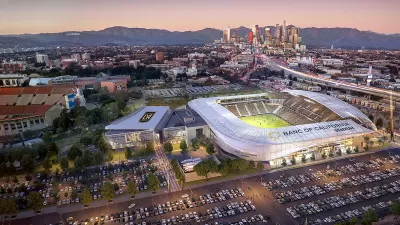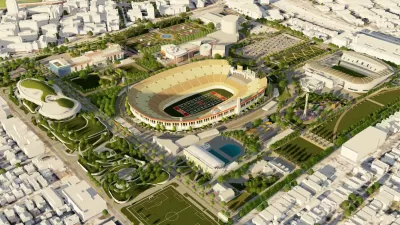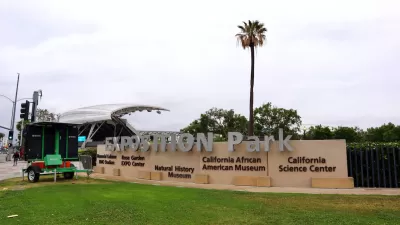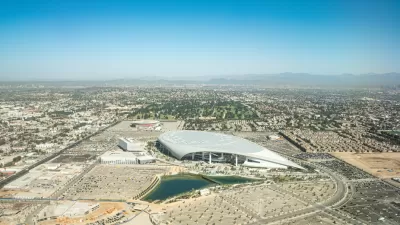Critics say the HUD program is meant to fund more direct anti-poverty measures, like affordable housing—not office, retail, and attractions.

Los Angeles city council recently voted to ask HUD for a loan of $22.5 million to fund commercial development around the MLS soccer stadium, slated to open in Exposition Park in 2018. Johnny Magdaleno explains in NextCity:
Through the Department of Housing and Urban Development’s Section 108 program, cities can qualify for low-interest loans to fill small funding gaps for development projects if these projects promise to give up to 51 percent of the jobs they create to low-income populations, and act as an economic boon for surrounding communities. The average loan amount is $4.9 million, and cities usually get between 10 and 20 years to pay them off.
Typically, the funds are awarded for community revitalization and anti-poverty projects. Even considering job creation, critics argue that construction of a sports museum, culinary academy, and conference center, among other things, would not be a faithful application of the program.
"When it comes to massive projects like a stadium, the long-term economic impacts on nearby communities are usually neutral or slightly negative," Magdaleno notes. And if anti-poverty funds get "eaten up" by a bad project, "it’s a double blow to the disadvantaged citizens these federal programs were crafted for."
He adds:
At the same time it’s giving out resources to commercial and industrial projects, HUD continues to slash funding for its affordable housing initiatives, and as of 2015 federal spending on housing assistance was $2.9 billion under what it was in 2004. That’s despite the fact that the number of families with access to rental assistance is at its lowest point in a decade, while demand is on the rise.
FULL STORY: L.A. Asks HUD to Back Private Sports Complex

Alabama: Trump Terminates Settlements for Black Communities Harmed By Raw Sewage
Trump deemed the landmark civil rights agreement “illegal DEI and environmental justice policy.”

Planetizen Federal Action Tracker
A weekly monitor of how Trump’s orders and actions are impacting planners and planning in America.

Why Should We Subsidize Public Transportation?
Many public transit agencies face financial stress due to rising costs, declining fare revenue, and declining subsidies. Transit advocates must provide a strong business case for increasing public transit funding.

Understanding Road Diets
An explainer from Momentum highlights the advantages of reducing vehicle lanes in favor of more bike, transit, and pedestrian infrastructure.

New California Law Regulates Warehouse Pollution
A new law tightens building and emissions regulations for large distribution warehouses to mitigate air pollution and traffic in surrounding communities.

Phoenix Announces Opening Date for Light Rail Extension
The South Central extension will connect South Phoenix to downtown and other major hubs starting on June 7.
Urban Design for Planners 1: Software Tools
This six-course series explores essential urban design concepts using open source software and equips planners with the tools they need to participate fully in the urban design process.
Planning for Universal Design
Learn the tools for implementing Universal Design in planning regulations.
Caltrans
Smith Gee Studio
Institute for Housing and Urban Development Studies (IHS)
City of Grandview
Harvard GSD Executive Education
Toledo-Lucas County Plan Commissions
Salt Lake City
NYU Wagner Graduate School of Public Service





























